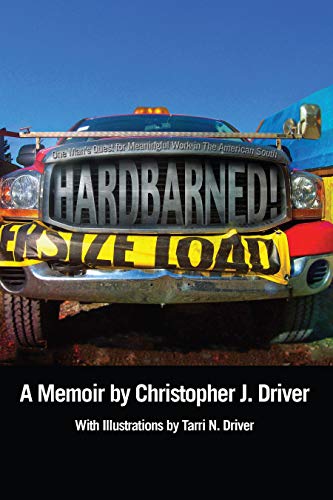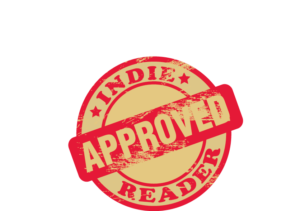HARDBARNED! One Man’s Quest for Meaningful Work in the American South received a 4+ star review, making it an IndieReader Approved title.
Following find an interview with author Chris Driver.
What is the name of the book and when was it published?
HARDBARNED! One Man’s Quest for Meaningful Work in the American South was published on August 23, 2016.
What’s the book’s first line?
“I have straddled the line between blue collar and white and have jumped boldly with two feet into both worlds.”
What’s the book about? Give us the “pitch”.
After earning a master’s degree in English, I didn’t want to teach and simply wanted a foot in the door to a professional writing career, basically in any industry, but with a full-time paycheck and benefits. Despite my education, these desires proved elusive, and I ended up driving a truck, delivering and repossessing portable storage barns in isolated, rural, southeastern backyards across several states. This was the craziest job I’d ever had, and it lasted for three years, as I constantly applied for writing jobs and got nowhere—something I never imagined would happen and a source of plenty of anger and soul-searching. Toward the end of those three years, aspects of the job that once filled me with rage started to make me laugh, and I started writing them down, which was both essential and cathartic for me, regardless of whether anyone ever read any of it. In time, I came to realize I had more to share than a lot of crazy, ridiculous and darkly comic stories about what happened to me when I worked as a barn-hauling truck driver. I realized I had more to say about my working life, the value of a liberal arts education in America and what it’s like to be overeducated and underemployed, as so many of us see the value of our college education slowly diminishing while our student loan debts fall into deferment. The book doesn’t offer self-help, inspirational uplift or fix anyone’s problems, but it is packed with authentic, darkly comic stories that may resonate with others with a sense of humor who are trying to apply a liberal arts education to the modern workplace and still feel like a human being.
What inspired you to write the book? A particular person? An event?
The book is a nonfiction memoir, and the crazy experiences I had on the job were the catalyst that got me writing in the first place.
What’s the main reason someone should really read this book?
I think a lot of people in America who don’t major in STEM or business fields and still see the value of a liberal arts education in the classical humanities sense must embrace a little dark humor to survive. Artists, writers, and even social-science majors have a tough go at it these days. College costs a lot more and is often worth a lot less. Building a career in America is tough, particularly for these folks, even with so many advantages, and that’s one of the things I really wrestle with in the book: What am I complaining about? Do I even have a right to be angry about not being able to apply my education to a “ satisfying” career? I have food, clothes, shelter and so much, and yet I’m unhappy with my working life. What a laughably American idea, right? Most people on the planet struggle unbelievably hard to simply achieve those first three basics. Still, this desire to get more out of our work is there in many of us, and for me, it persists. If you can’t laugh at this stuff, you’re going to be depressed, and it’s more fun to laugh. I hope there’s an audience out there that would agree and be entertained by my book.
If they made your book into a movie, who would you like to see play the main character(s)?
HA! My dream would be adapting a screenplay with Joel Stein, for direction by Mike Judge, with someone like Jason Bateman or Paul Rudd in the starring role, or maybe someone like Thomas Mann, if we needed someone a little younger. He impressed me in Me and Earl and the Dying Girl.
When did you first decide to become an author?
My folks have both written professionally, but it took me a while to get there. I was in punk rock and metal bands growing up, and my first writing experiences came from writing songs. I went to college intending to become a recording engineer (and record bands) but realized while taking some great film studies courses that reading and writing was a better fit. The book idea didn’t arrive until I was knee deep in barns, post-grad.
Is this the first book you’ve written?
Yep. Hopefully not the last.
What do you do for work when you’re not writing?
A couple years after my tour-de-barns, I finally managed to get a foot in the door and have since been able to build a professional writing career. These days I write mostly digital content for an ad agency. It beats hauling barns.
How much time do you generally spend on your writing?
That depends on what I’m writing and whether I have a deadline, but I tend to take a while on my personal stuff. I used to blog a lot, and now I post something new a lot less often, but I realize it’s mostly for me, as I don’t think I have much of an audience! I wish I could force myself to blog more often.
What’s the best and the hardest part of being an indie?
Hmmm. I feel like I’ve always been “an indie.” I guess I’ve always identified with the outsiders, underdogs and fringe elements. Creative people often talk about the ugly intersection between art and commerce, and I get that, but I feel like if you’re being authentic in your work, people will notice that and appreciate it, even if it’s just two people, which is fine. I’ve not been writing songs or music for several years, and I may get back to that because I miss it, but I’m not going to stop being creative. My wife is an artist (she illustrated my book), and she and I talk about this all the time. Making stuff is just what we have to do, audience or no audience. It’s part of who we are and how we live.
What’s a great piece of advice that you can share with fellow indie authors?
I don’t know if I’m in any position to give anyone advice about being an author. What works for me is striving to be authentic and honest and not being afraid to poke fun at myself. Writing for a particular market or audience isn’t really something that would occur to me, but some people do it and, I guess, find great success.
Would you go traditional if a publisher came calling? If so, why?
It depends on what they’d offer me, but I’d consider it. I like having more control of my work, but I am not a fan of marketing myself and could probably use some help getting the word out that the book exists.
Is there something in particular that motivates you (fame? fortune?)
I feel very fortunate already, but it would be fantastic to get the book in front of more people who might enjoy it, and I’m a huge movie nerd, so I’d love to see it adapted one day.
Which writer, living or dead, do you most admire?
I don’t really have a single favorite, as there are so many great ones, but when it comes to fiction, I’m a big fan of anything Adrian McKinty has written. He has a couple Irish crime series that are fantastic.
Which book do you wish you could have written?
That’s tricky. I guess the book I wish I could have written is probably the next book I will write. I don’t wish to have written someone else’s work.

